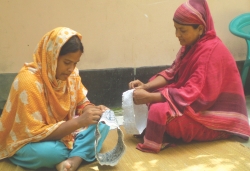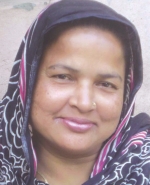SHE
Kurigram
Cash from Caps
The enthusiastic women of the Patilapur village of Thetrai union under Ulipur upazila in the district of Kurigram have turned the area into an industrial cap manufacturing zone. Hundreds of women have been busy stiching caps of different colours for the Eid festival and earning decent amounts for their labor.
.................................................................................................
Abdul Wahed
 Once ready, the caps are exported to middle-eastern countries like Oman, Kuwait and Saudi Arabia. At least 60,000 caps are produced each year. Each cap is sold in middle-eastern countries for an average amount of Tk. 1,000. Once ready, the caps are exported to middle-eastern countries like Oman, Kuwait and Saudi Arabia. At least 60,000 caps are produced each year. Each cap is sold in middle-eastern countries for an average amount of Tk. 1,000.
According to the accounts, caps worth Tk. 6,000,000 are exported every year from the villages. Several women have changed their lifestyles by making caps.
One of the pioneers of the cap manufacturing industry is a veteran named, Morsheda Begum, the wife of Jobed Ali of Patilapur village was married when she was a student of class 10.
In 1995 her husband worked at a towel factory in the Tangail district (Dhaka). There she learnt process of making caps from her neighbor - Kamola Begum. Back then she used to receive Tk. 350 as daily wage while working as Kamola's laborer.
Morsheda Begum returned home to the Ulipur upazila in 2000. A year later she received an order for making caps and earned about Tk. 17,000.
Women of her village and the surrounding villages were interested about learning how to make caps. Up until now, she has trained about 6,000 women from nine different villages in the Ulipur upazila on how to make caps.
The villages under Ulipur upazila are Thetrai, Nagrerkura, Kukuapara, Charuapara, Guaigach, Bangalipara, Daldalia, Miapara and Patilapur.
Morsheda Begum said, “I sold some caps to two cap traders a few years ago. The caps were then supplied by them to retailers in middle-eastern countries. The traders assisted me by providing silk thread for making designer caps the following year.”
 Morsheda continued, “To keep up with the traders' demands I made caps with the help of my trained assistants and received payments of Tk.300 to Tk.350 for per cap, then I started taking a commission of Tk.30 to Tk.40 per cap from my assistants. The work was distributed amongst the assistants in my village and the neighboring villages. One supervisor was appointed for each village.” Morsheda continued, “To keep up with the traders' demands I made caps with the help of my trained assistants and received payments of Tk.300 to Tk.350 for per cap, then I started taking a commission of Tk.30 to Tk.40 per cap from my assistants. The work was distributed amongst the assistants in my village and the neighboring villages. One supervisor was appointed for each village.”
“I supplied over 5,000 caps to the traders every month. But productivity fell during paddy harvesting season. During that time the women are busy with harvesting…” She concluded.
An assistant - Shima Aktar, 22, of Miapara village said, “I have been making caps from the past two years after being trained. I earn Tk. 600 to Tk. 700 per month by working in my free time.”
Shapla Khatun, a student of class eight from Thetrai High School, said, “I make caps some times after returning home from school. I buy my study materials and clothes with my income.”
Morsheda said, “I was very poor. Now I have constructed four tin-shed houses and bought land worth Tk. 2,00,000. Both my daughters have started school.”
“My dream is to become self-reliant. I would set up a silk factory if I manage to get Tk. 10,00,000. Then I could create jobs for at least 15,000 women”, said Morsheda.
Chairman of the Thetrai union Ruhul Amin Bakshi said, “There is a lot of pressure on making caps before the Eid festivals, but the women have to work during all seasons here. Cap-making has created many job opportunities for many unemployed women here.”
Copyright
(R) thedailystar.net 2012 |

 O
O Morsheda continued, “To keep up with the traders' demands I made caps with the help of my trained assistants and received payments of Tk.300 to Tk.350 for per cap, then I started taking a commission of Tk.30 to Tk.40 per cap from my assistants. The work was distributed amongst the assistants in my village and the neighboring villages. One supervisor was appointed for each village.”
Morsheda continued, “To keep up with the traders' demands I made caps with the help of my trained assistants and received payments of Tk.300 to Tk.350 for per cap, then I started taking a commission of Tk.30 to Tk.40 per cap from my assistants. The work was distributed amongst the assistants in my village and the neighboring villages. One supervisor was appointed for each village.”